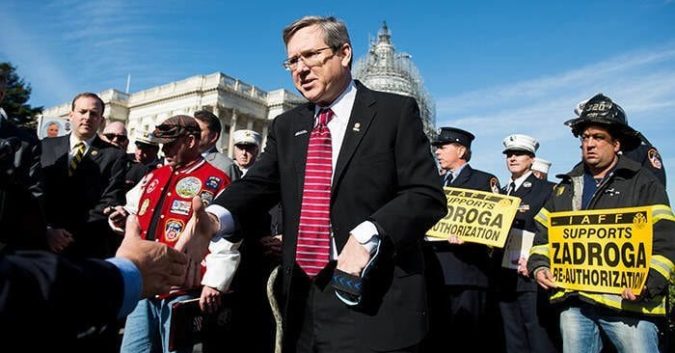Advocates of reauthorizing the recently expired James Zadroga 9/11 Health and Compensation Act gained the support of an influential group of veterans this past week.
On Tuesday, the Iraq and Afghanistan Veterans of America (IAVA) announced their endorsement of a permanent extension of the bill at a press conference outside the US Capitol. Members of the IAVA joined members of congress from both parties at the event to promote the James Zadroga 9/11 Health and Compensation Reauthorization Act (S. 928/H.R.1786). Also present were 9/11 first responders and the leaders of other veterans’ organizations, including the American Legion, Vietnam Veterans of America (VVA), and the United States Army Warrant Officers Association (USAWOA).
Paul Rieckhoff, veteran of the Iraq war and founder of the IAVA, was a prominent speaker at the rally:
“September 11th defined a lasting call to service for many Americans. However, for both the post-9/11 generation of veterans and the 9/11 first responders, the consequences of their service extended far beyond that terrible day. As a Ground Zero first responder myself, I will devote the full resources of our organization to ensure our heroes are not neglected. Our country can’t afford to turn our backs on the 9/11 families, first-responders and veterans who have answered the call of service. Since that day, over 2.8 million veterans have served in Iraq and Afghanistan, and their service continues today both at home and abroad. We urge every lawmaker on the hill to support the continuation of the Zadroga Act.”
A Bill to Save the Heroes of 9/11
The original Zadroga Bill, signed into law by President Obama on January 2, 2011, ensured federal funding to cover the medical and compensatory expenses of 9/11 first responders. First responders are a group with a much higher chance of developing a wide variety of diseases, including mesothelioma and other cancers, due to their prolonged exposure to toxic materials during the 9/11 rescue and recovery work.
The IAVA says that of the approximately 72,000 first responders who worked at Ground Zero in the weeks and months following 9/11, over 33,000 have at least one 9/11-related medical problem. Over 4,100 of these men and women have developed cancer due to the heroic and dangerous rescue work they performed.
Also according to the IAVA, over 94 New York Police Department officers and 110 Firefighters have died as a result of 9/11 injuries and illnesses.
The toxic dust in the air at Ground Zero was full of asbestos and other carcinogenic materials. Mesothelioma, a type of lung-cancer that develops as a result of exposure to asbestos, typically takes 20-50 years before symptoms are shown. Consequently, the casualties of 9/11 are expected to only increase as the years pass further away from that terrible day.
The Zadroga Bill protected these selfless men and women who are suffering and dying. This important piece of legislation, though, expired on October 1, 2015. If Congress fails to act, then by as early as September 2016 first responders will begin to lose their healthcare coverage, which would be a tragedy and a lapse in the ethical accountability of our politicians.
Success & Obstacles for Veterans Joining Fight for Justice
The coalition of first-responders and veterans that lobbied Congress on November 17th demanded a permanent extension of the Zadroga Bill. Their efforts were not in vain.
The same day, over a dozen members of Congress pledged their support for the bill, including military veterans Representatives Mark Kirk (R-IL) and Tulsi Gabbard (D-HI). Presidential candidate and Senator Marco Rubio (R-FL) also signed on to the bill’s reauthorization. Senator Rubio joins Senator Bernie Sanders (D-VT) and Senator Lindsey Graham (R-SC) as fellow White House hopefuls who support the bill.
The New Numbers Are Good, but Bill Still Faces Opponents
The additions to those in favor of passing a permanent extension of the bill bring the numbers up to 65 Senate co-sponsors and 248 House co-sponsors. What this means is that these numbers are now sufficient for the reauthorization bill to pass. However, the bill cannot be voted on until it is brought to the floor by recently-appointed Speaker of the House Paul Ryan (R-WI).
Ryan is apparently in close dialogue with Republican colleagues Representative Fred Upton (R-MI) and Representative Bob Goodlatte (R-VA). Both Upton and Goodlatte have shown reluctance in signing on to a permanent extension of the Zadroga Bill.
In fact, Republican Representative Goodlatte has recently introduced legislation that directly competes with the Zadroga Reauthorization Act. Counter to the Zadroga Bill, Goodlatte’s proposal would dramatically reduce funding for sick 9/11 first responders. The bill would also only extend the current legislation by another 5 years—which is not nearly enough. The fate of the selfless heroes of 9/11 is then, in some ways, held by Speaker Paul Ryan: which bill will he bring to the table, the Zadroga Reauthorization Act, or the insulting and shameful Goodlatte alternative?
Hopefully, Speaker Ryan remembers the words of famed comedian and New Yorker Jon Stewart, who spoke at a Zadroga Bill extension rally on September 16th:
“These illnesses that [the first responders] have are not on five year cycles. They’re permanent illnesses causing permanent damage.”
